The winding down of the Affordable Connectivity Program (ACP) by the Federal Communications Commission (FCC) has significant implications for enrolled households across the United States.
Nearly 23 millions of households that rely on the ACP for affordable broadband access are at risk of losing internet connectivity.

Impact of FCC’s Decision to Wind Down ACP
The decision to wind down the ACP has far-reaching consequences for enrolled households receiving benefits like free iPhone government phone. These households, which include both rural and urban areas, depend on the program for affordable broadband services.
Without the ACP, these households are at risk of losing access to the internet, which is crucial for various aspects of their lives, such as work, education, healthcare, and more.
The FCC’s decision to wind down the program has raised concerns about the implications it will have on these households and their ability to stay connected.
Consumer Guidelines for Affordable Connectivity Program Wind-Down
Enrolled households need to be aware of the key dates and deadlines for the wind-down process to ensure they take the necessary actions.
The ACP stopped accepting new applications and enrollments on February 8th. Enrolled households at the time of the enrollment freeze will be able to remain enrolled until the final month of ACP service if they are not required to be de-enrolled under FCC rules.
It is essential for these households to carefully review written notices from their internet companies and the Universal Service Administrative Company (USAC) about the ACP wind-down.
Protection Measures and Consumer Rights
FCC rules are in place to protect ACP recipients and ensure their access to supported broadband services. These rules empower consumers to choose the service plan that best meets their needs, irrespective of their credit status.
Providers are prohibited from excluding consumers with past due balances or prior debt from enrolling in the program.
The ACP also prevents consumers from being forced into more expensive or lower quality plans.
Early termination fees are not applicable, and consumers have the option to switch providers or broadband service offerings.
In case of any issues, consumers can file a complaint through the dedicated FCC process for ACP complaints.
Conclusion
The winding down of the Affordable Connectivity Program has significant implications for enrolled households across the country. The potential loss of internet connectivity threatens their ability to work, learn, access healthcare, and more.
It is crucial for enrolled households to be aware of the wind-down process, review written notices, and understand their rights and protections under the program. The participation of various internet companies in the ACP ensures that eligible households have access to affordable broadband services.

